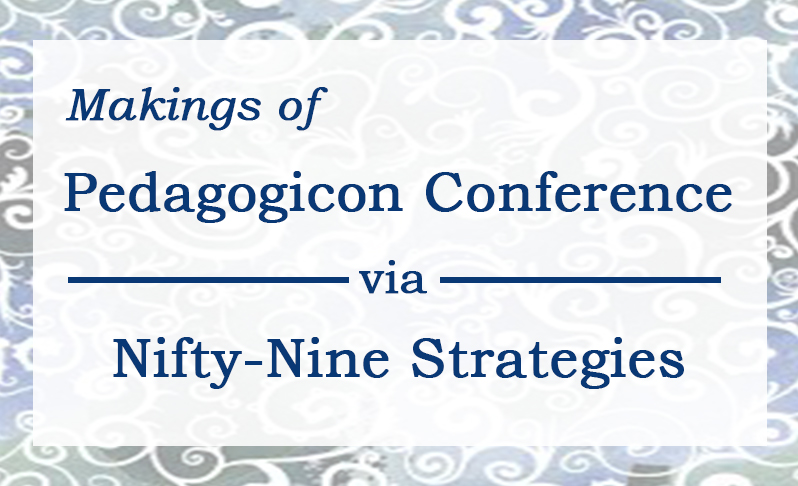What are the best practices for integrating creativity into the classroom? For teaching creatively? Or for teaching creativity?
These were some of the questions we asked at Eastern Kentucky University (EKU). Hal Blythe, Rusty Carpenter, and I published several books on applied creative thinking but we wanted to increase the conversations about the scholarship of teaching on our campus and in the Commonwealth.
This is how we came to organize the annual Pedagogicon Conference for Practicing Scholarly and Creative Teaching–an event geared for educators seeking to discover the most effective teaching practices.
Why We Developed the Pedagogicon Conference Using Nifty-Nine Strategies
We developed the idea of Pedagogicon by applying core applied creative thinking concepts we refer to as the nifty-nine strategies. These nine steps include: collaborating; perception shifting; piggybacking; brainstorming; glimmer-catching; playing; recognizing patterns; using metaphor; and flowing. By connecting the event’s planning process back to to the above strategies, we were able to create a conference that shed light on some of the most pressing issues in teaching and learning in today’s higher education.
A Process of Using the Nifty-Nine Strategies for Creating a Conference
In coming up with Pedagogicon, we first caught a glimmer of a great possibility by collaborating (Hal, Charlie, and I) to create a 21st-century academic conference to support faculty development. For the past few years, our state organization in charge of coordinating higher education institutions in Kentucky, the Council on Postsecondary Education, sponsored a conference that combined instructional technology (IT) and faculty development. Focusing on creative approaches, we wanted to separate the two strands into two distinct but complementary conferences while focusing on the pedagogical development of faculty and administrators throughout the state. 
We needed a catchy name that combined the fundamental and powerful concepts (FPCs) of our last few books in the Applied Creative Thinking and It Works For Me series. After a lot of brainstorming, we came up with the Kentucky Pedagogicon by recognizing a pattern in pop culture conventions, especially the growing popularity of comic book conferences—i.e., comicons. For our central theme, we played with the FPCs of our previous books to fashion “Practicing Scholarly and Creative Teaching.”
Findings from the Pedagogicon Conference
While the Pedagogicon at EKU highlighted creative and scholarly teaching, we realized the need to integrate more student voices into this statewide conversation. As is the case with highly effective teaching, we need to seek ways to engage the student perspective. In the Noel Studio, where we held the Pedagogicon, we commonly see students working side by side with one another, thinking and learning creatively. If we pay attention to the collaboration and invention practices of our students, we might learn a bit more about inspiring creativity in our classroom spaces. 
Author
 Russell Carpenter, Executive Director of the Noel Studio for Academic Creativity and Program Director of Applied Creative Thinking at Eastern Kentucky University where he is also Associate Professor of English. Dr. Carpenter has published on the topic of creative thinking, among other areas, including three texts by New Forums Press: Introduction to Applied Creative Thinking (with Charlie Sweet and Hal Blythe, 2012), Teaching Applied Creative Thinking (with Charlie Sweet, Hal Blythe, and Shawn Apostel, 2013), and It Works for Me, Flipping the Classroom: Shared Tips for Effective Teaching, (with Hal Blythe and Charlie Sweet, 2015). He has guest edited or co-edited special issues of the Journal of Faculty Development on social media and the future of faculty development. In addition, he has taught courses in creative thinking in EKU’s Minor in Applied Creative Thinking, which was featured in the New York Times in February 2014, and rhetoric and composition in the Department of English. Dr. Carpenter earned a Ph.D. in Texts & Technology from the University of Central Florida (UCF) in 2009. Meet Russell.
Russell Carpenter, Executive Director of the Noel Studio for Academic Creativity and Program Director of Applied Creative Thinking at Eastern Kentucky University where he is also Associate Professor of English. Dr. Carpenter has published on the topic of creative thinking, among other areas, including three texts by New Forums Press: Introduction to Applied Creative Thinking (with Charlie Sweet and Hal Blythe, 2012), Teaching Applied Creative Thinking (with Charlie Sweet, Hal Blythe, and Shawn Apostel, 2013), and It Works for Me, Flipping the Classroom: Shared Tips for Effective Teaching, (with Hal Blythe and Charlie Sweet, 2015). He has guest edited or co-edited special issues of the Journal of Faculty Development on social media and the future of faculty development. In addition, he has taught courses in creative thinking in EKU’s Minor in Applied Creative Thinking, which was featured in the New York Times in February 2014, and rhetoric and composition in the Department of English. Dr. Carpenter earned a Ph.D. in Texts & Technology from the University of Central Florida (UCF) in 2009. Meet Russell.


